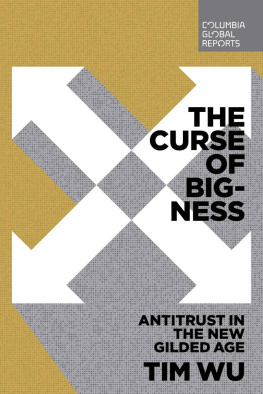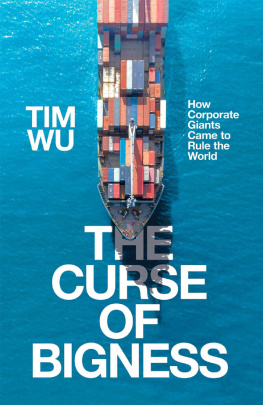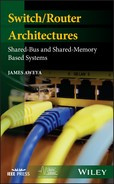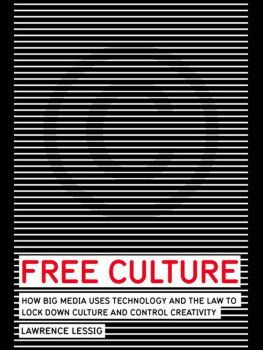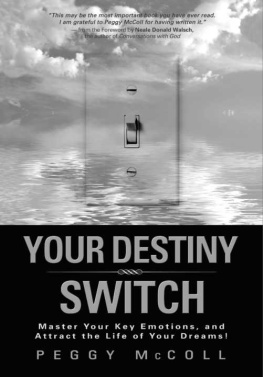Acknowledgments
Many people helped me with this book. George Andreou is the best editor I have ever worked with and a fine prose stylist. Tina Bennett, my literary agent, understands writers better than they understand themselves. My dean David Schizers support made this book possible, and I thank the entire faculty of Columbia Law School for their support and tolerance. I thank the editors at Slate magazine, particularly Jacob Weisberg, Dahlia Lithwick and Josh Levin, for giving me room to try out many of the ideas that went into this book.
Research assistants at Columbia Law School and the New America Foundation provided indispensable help with this book. Their ranks initially included Hailey DeKraker, the lead research assistant, Alex Middleton, who dug out the Hush-A-Phone hearings, and Luis Villa. Later help came from Anna-Marie Anderson, Kendra Marvel, and Judd Schlossberg, who provided research rescue at a critical hour. Faith Smith at New America and her team of researchers found things I wouldnt have thought existed, and I also thank the UCLA library, site of the Hodkinson papers. The multitalented, long-suffering Stuart Sierra did the diagrams. I also thank the reference librarians at Columbia Law School, who provided timely access to everything, the library staff at Stanford Law School, and Lily Evans at Knopf.
Kathryn Tucker made important early suggestions and helped crystallize the idea of a Cycle at the center of the book. Scott Hemphill gave me especially useful comments, twice, and constant feedback on economic questions; other helpful assistance, ideas, and feedback came from Larry Lessig, Chris Libertelli, Charles Sabel, Derek Slater, Michael Heller, Andrew McLaughlin, Jennifer 8. Lee, Siva Vaidhyanathan, Hal Edgar, Diana Sanchez, Robert Wright, Richard Posner, Judith Judge, David Wu, and Louis Wolcher. I also feel deeply indebted to a series of authors, some of whom I have never met, who have written particularly helpful histories of communications and the media, including Paul Starr, Katie Hafner, Matthew Lyon, Milton Mueller, Connie Brooks, Lawrence Lessing, Thomas White, Ken Auletta, Herbert N. Casson, and many others. I presented early versions of this book at the New America Foundation, Columbia Law School, the University of Washington, the Stanford Communications Department, the Institute of International and European Affairs in Dublin, and the West Virginia School of Law.
Finally, I wish to thank my family, particularly my mother, who broke our budget to buy an Apple II+ in 1982 and thereby started this book, and my in-laws, who helped me finish it. And finally thanks to Kate Judge, who helped straighten out the logic and waited patiently every time I embarked on those long train rides meant to make this book happen.
A BOUT THE A UTHOR
Tim Wu is an author, a policy advocate, and a professor at Columbia University. In 2006 he was recognized as one of fifty leaders in science and technology by Scientific American magazine, and in 2007, 01238 magazine listed him as one of Harvards one hundred most influential graduates. He writes for Slate, where he won the Lowell Thomas gold medal for travel journalism, and he has contributed to The New Yorker, TIME, The New York Times, The Washington Post, and Forbes. He is a fellow of the New America Foundation and the chairman of the media reform organization Free Press.
CHAPTER 1
The Disruptive Founder
E xactly forty years before Bells National Geographic banquet, Alexander Bell was in his laboratory in the attic of a machine shop in Boston, trying once more to coax a voice out of a wire. His efforts had proved mostly futile, and the Bell Company was little more than a typically hopeless start-up.
Bell was a professor and an amateur inventor, with little taste for business: his expertise and his day job was teaching the deaf. His main investor and the president of the Bell Company was Gardiner Green Hubbard, a patent attorney and prominent critic of the telegraph monopoly Western Union. It is Hubbard who was responsible for Bells most valuable asset: its telephone patent, filed even before Bell had a working prototype. Besides Hubbard, the company had one employee, Bells assistant, Thomas Watson. That was it.
If the banquet revealed Bell on the cusp of monopoly, here is the opposite extreme from which it began: a stirring image of Bell and Watson toiling in their small attic laboratory. It is here that the Cycle begins: in a lonely room where one or two men are trying to solve a concrete problem. So many revolutionary innovations start small, with outsiders, amateurs, and idealists in attics or garages. This motif of Bell and Watson alone will reappear throughout this account, at the origins of radio, television, the personal computer, cable, and companies like Google and Apple. The importance of these moments makes it critical to understand the stories of lone inventors.
Over the twentieth century, most innovation theorists and historians became somewhat skeptical of the importance of creation stories like Bells. These thinkers came to believe the archetype of the heroic inventor had been over-credited in the search for a compelling narrative. As William Fisher puts it, Like the romantic ideal of authorship, the image of the inventor has proved distressingly durable. These critics undeniably have a point: even the most startling inventions are usually arrived at, simultaneously, by two or more people. If thats true, how singular could the genius of the inventor really be?
There could not be a better example than the story of the telephone itself. On the very day that Alexander Bell was registering his invention, another man, Elisha Gray, was also at the patent office filing for the very same breakthrough.
There was, it is fair to say, no single inventor of the telephone. And this reality suggests that what we call invention, while not easy, is simply what happens once a technologys development reaches the point where the next step becomes available to many people. By Bells time, others had invented wires and the telegraph, had discovered electricity and the basic principles of acoustics. It lay to Bell to assemble the pieces: no mean feat, but not a superhuman one. In this sense, inventors are often more like craftsmen than miracle workers.
Indeed, the history of science is full of examples of what the writer Malcolm Gladwell terms simultaneous discoveryso full that the phenomenon represents the norm rather than the exception. Few today know the name Alfred Russel Wallace, yet he wrote an article proposing the theory of natural selection in 1858, a year before Charles Darwin published The Origin of Species. Leibnitz and Newton developed calculus simultaneously. And in 1610 four others made the same lunar observations as Galileo.
Is the loner and outsider inventor, then, merely a figment of so much hype, with no particular significance? No, I would argue his significance is enormous; but not for the reasons usually imagined. The inventors we remember are significant not so much as inventors, but as founders of disruptive industries, ones that shake up the technological status quo. Through circumstance or luck, they are exactly at the right distance both to imagine the future and to create an independent industry to exploit it.
Lets focus, first, on the act of invention. The importance of the outsider here owes to his being at the right remove from the prevailing currents of thought about the problem at hand. That distance affords a perspective close enough to understand the problem, yet far enough for greater freedom of thought, freedom from, as it were, the cognitive distortion of what is as opposed to what could be. This innovative distance explains why so many of those who turn an industry upside down are outsiders, even outcasts.


